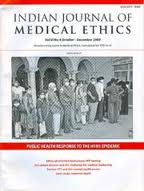A recent study published in the Indian Journal of Medical Ethics reveals that over half of all doctors who responded, 56%, admit that they have observed plagiarism in papers being submitted to medical journals.
 The survey, which was sent only to physicians that had received at least five publications between August 2012 and March 2013, received approximately 155 responses. Those responses appear to indicate that, despite widespread understanding of research ethics, the best practices were not being followed by many in the country.
The survey, which was sent only to physicians that had received at least five publications between August 2012 and March 2013, received approximately 155 responses. Those responses appear to indicate that, despite widespread understanding of research ethics, the best practices were not being followed by many in the country.
The study also found that 65% of doctors had observed or participated in cases where a physician was gifted authorship to a paper, meaning they were given authorship credit despite not having contributed to the paper. Also, 33.5% said that they had seen the inverse, researchers who had worked on a paper having their names removed.
The authors of the study, Dhulika Dhingra and Devendra Mishra, admitted to several limitations to it including that most participating researchers were from medical colleges, where the pressure to publish is often higher. Furthermore the study only asked if researchers had observed the unethical acts, not if they had participated in them.
According to Dr. George Thomas, the editor for the Indian Journal of Medical Ethics, the issue of gifting authorship is common at universities where department heads or professors will push students into adding them to papers that they did not contribute to or otherwise assume they are entitled to such attribution. It’s also an issue in hospitals where, in some cases, doctors will demand paper authorship in exchange for the use of the facility.
Overall, the survey paints a grim picture for compliance with research ethics in India. Though all doctors responded they were aware of the rules of research ethics, 91% say they observed some infraction of them.
The survey comes as doctors from India have been in high demand to fill shortages in other countries, this includes the United Kingdom, which recently recruited 50 Indian physicians to fill shortages in emergency rooms in the country.
Despite the great strides the country has made in the quality and prominence of its research, it has continued to struggle with issues of plagiarism and research ethics.
Progress in this area has been partially hampered by the fact India does not have a central authority for handling scientific misconduct, similar to the Office of Research Integrity in the United States and enforcement of ethical rules tends to be inconsistent.
Still, the growing chorus of concern is a sign of progress and, though studies such as this one might be disheartening, the fact that they exist show that the country is trying to both understand and address the issue.
However, as Dr. Thomas said, the issue won’t be resolved until everyone wants to bring about change and, as long as many people with authority benefit from the system that’s in place, change will come very slowly.
India has made good progress in teaching undergraduate and graduate students about research ethics, laying the groundwork so that, as younger researchers enter the field, they will bring with them both a better understanding and implementation of research ethics, including preventing plagiarism.
The opinions expressed here are my own and do not represent the views of iThenticate.
Related
Topics: International